 Petzlover
Petzlover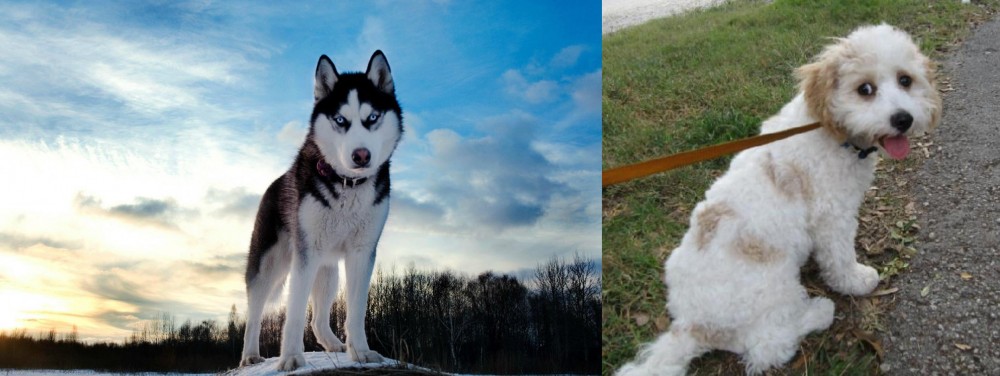 Both Alaskan Husky and Cavachon are originated from United States. Alaskan Husky may grow 23 cm / 10 inches higher than Cavachon. Alaskan Husky may weigh 15 kg / 34 pounds more than Cavachon. Both Alaskan Husky and Cavachon has same life span. Alaskan Husky may have more litter size than Cavachon. Alaskan Husky requires Low Maintenance. But Cavachon requires Moderate Maintenance
Both Alaskan Husky and Cavachon are originated from United States. Alaskan Husky may grow 23 cm / 10 inches higher than Cavachon. Alaskan Husky may weigh 15 kg / 34 pounds more than Cavachon. Both Alaskan Husky and Cavachon has same life span. Alaskan Husky may have more litter size than Cavachon. Alaskan Husky requires Low Maintenance. But Cavachon requires Moderate Maintenance
 Alaskan Husky is created to be a working dog who can do many different jobs like hauling logs, transport, supplies delivery, racing dogs, etc. Mushers created this breed. Alaskan Husky is created as a mix of Inuit dog, Siberian Husky, Greyhound and German pointers, and it is very difficult to find pure breed Alaskan Husky, and they are not recognized by any Kennel club.
Alaskan Husky is created to be a working dog who can do many different jobs like hauling logs, transport, supplies delivery, racing dogs, etc. Mushers created this breed. Alaskan Husky is created as a mix of Inuit dog, Siberian Husky, Greyhound and German pointers, and it is very difficult to find pure breed Alaskan Husky, and they are not recognized by any Kennel club.
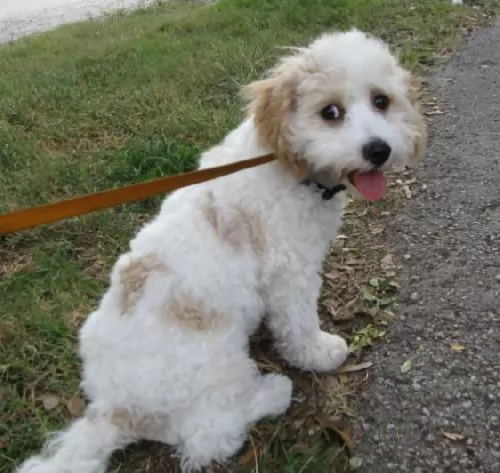 The Cavachon dog is a mix of the Bichon Frise and a Cavalier King Charles Spaniel. There isn’t much on the history of the dog but it seems as though certain kennels in Berryville, Virginia, in the United States are the first breeder of the dog, establishing the hybrid dog in 1996.
The Cavachon dog is a mix of the Bichon Frise and a Cavalier King Charles Spaniel. There isn’t much on the history of the dog but it seems as though certain kennels in Berryville, Virginia, in the United States are the first breeder of the dog, establishing the hybrid dog in 1996.
This attractive little toy breed has become one of the most popular cross-breed dogs to own in the United Kingdom, United States, Europe and other parts of the world. As it is a hybrid, the Cavachon isn’t recognized by the American Kennel Club (AKC), but it is recognized by the American Canine Hybrid Club (ACHC).
 Alaskan Husky average weight depends from dog to dog, but on average male weights 21-25kg, while their height is moderate size. Females are slightly smaller than males, and they can weight 17-19kg.
Alaskan Husky average weight depends from dog to dog, but on average male weights 21-25kg, while their height is moderate size. Females are slightly smaller than males, and they can weight 17-19kg.
A lifespan of Alaskan Husky depends, again, from dog to dog, but it is 10-15 years. Of course, if you are taking care of your dog, they can live much longer.
Litter Size of average female is 4-10 puppies.
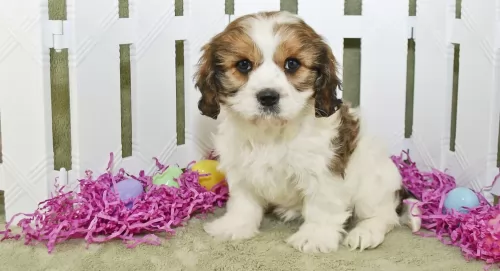 Cavachons are small dogs standing from 31 - 33 cm at the withers and weighing 4.5 - 9 kg. He has a medium-to-long silky coat which can be slightly wavy or even straight. The coat is available in several different colors – with white being the main color and he’ll have patches of apricot, tan and black or a mix of these colors.
Cavachons are small dogs standing from 31 - 33 cm at the withers and weighing 4.5 - 9 kg. He has a medium-to-long silky coat which can be slightly wavy or even straight. The coat is available in several different colors – with white being the main color and he’ll have patches of apricot, tan and black or a mix of these colors.
Individual dogs will vary to some extent depending on which parent breed is more dominant, but they’ve generally got a compact, well formed body and short legs. People with allergies appreciate this breed as they don’t shed a lot.
The Cavachon isn’t aggressive at all and they are sweet dogs, enjoying being around children. Their wonderful nature makes them a great therapy dog as they love to charm and delight people. He is tolerant of the actions of children as well as being able to get on well with other dogs and cats in the home.
Even small dogs like the Cavachon however can benefit from training and socialization, and then he becomes a wonderful obedient little dog. He is actually more robust than he looks and this is what makes him such a good pet for children.
He is a social little dog and just loves his human family and doesn’t want to be left alone for any long lengths of time. His lack of aggression means you can’t really rely on him to be much of a guard dog although he will give you some warning with his barking.
 Alaskan Husky is the best dog for the active people or families. They are bred to be working dogs. This breed is not created for it looks or pedigree, but this breed is bred purely to help with various tasks. They love being around the family, and they are very happy and cheerful. Alaskan Husky is not good watchdogs because they love everyone, including strangers. They are highly intelligent breed, but it can be tricky to train them sometimes. You must be a leader who makes decisions because if you are not confident, they will not see the reason for listening to you. The best way of training your dog would be with patience and firm, decisive manner. The old-fashioned way of training that includes punishment is not recommendable. They do not respond well to that. Training with awards is the best way to teach your dog. Alaskan Husky is a very active dog, so they are not very good for apartments. Although, you can have them in apartments but only if they have active walks and exercises. They love jogging, and they can be excellent buddies in any activity. They will love all the animals but it is important for them to socialize from the early age.
Alaskan Husky is the best dog for the active people or families. They are bred to be working dogs. This breed is not created for it looks or pedigree, but this breed is bred purely to help with various tasks. They love being around the family, and they are very happy and cheerful. Alaskan Husky is not good watchdogs because they love everyone, including strangers. They are highly intelligent breed, but it can be tricky to train them sometimes. You must be a leader who makes decisions because if you are not confident, they will not see the reason for listening to you. The best way of training your dog would be with patience and firm, decisive manner. The old-fashioned way of training that includes punishment is not recommendable. They do not respond well to that. Training with awards is the best way to teach your dog. Alaskan Husky is a very active dog, so they are not very good for apartments. Although, you can have them in apartments but only if they have active walks and exercises. They love jogging, and they can be excellent buddies in any activity. They will love all the animals but it is important for them to socialize from the early age.
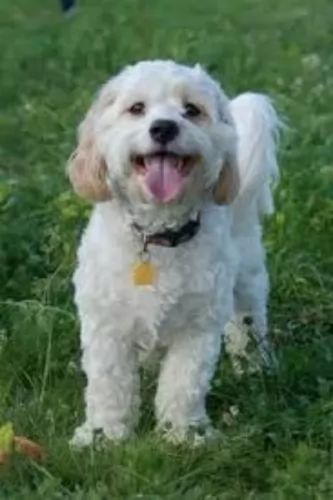 The sweet Cavachon is a balanced, happy, social dog and with his amicable nature and appealing looks, everybody wants him as a friend. He is fun and entertaining and makes a wonderful family pet and playmate for children.
The sweet Cavachon is a balanced, happy, social dog and with his amicable nature and appealing looks, everybody wants him as a friend. He is fun and entertaining and makes a wonderful family pet and playmate for children.
He gets on well with other pets in the home too. Even though he is a small dog, he will require training and socialization as his cuteness tends to make him want to assert himself over his owner. With socialization he becomes the most awesome, loyal and devoted little companion.
 This breed has no any specific health issues. However, as any breed they can develop some issues that are related to genetics. It is very important to discuss with owners that you are getting the dog from, and if they are not ready to show medical records or proofs that dogs are healthy then you should be extra careful. If you do not have a lot of experience in getting a puppy or an adult dog, you should bring someone who has more experience. Again, this breed is very healthy and if you give them adequate caring with regular vet checks you will have a healthy and a happy dog for a long time.
This breed has no any specific health issues. However, as any breed they can develop some issues that are related to genetics. It is very important to discuss with owners that you are getting the dog from, and if they are not ready to show medical records or proofs that dogs are healthy then you should be extra careful. If you do not have a lot of experience in getting a puppy or an adult dog, you should bring someone who has more experience. Again, this breed is very healthy and if you give them adequate caring with regular vet checks you will have a healthy and a happy dog for a long time.
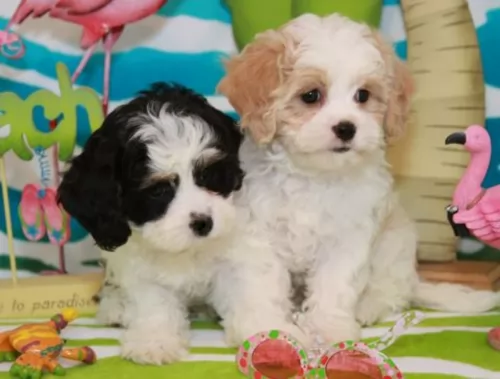 Although a mixed breed such as the Cavachon is considered healthy, they can still have their share of health problems. Some of the common health problems that the Cavachon may have to contend with and which come from the Cavalier King Charles Spaniel and the Bichon Frise are ear infections, liver problems, hip dysplasia and eye problems.
Although a mixed breed such as the Cavachon is considered healthy, they can still have their share of health problems. Some of the common health problems that the Cavachon may have to contend with and which come from the Cavalier King Charles Spaniel and the Bichon Frise are ear infections, liver problems, hip dysplasia and eye problems.
A healthy Cavachon who has been fed well and nurtured can live to be up to 15 to 18 years.
Arthritis is a disease seen in many dogs and it is inflammation of the joints because of wear and tear. You’ll notice lameness with your pet, stiffness, swelling, heat and pain and even depression.
Your pet may even display some aggressive behavior because of the pain, but this is excusable as this isn't an aggressive breed. Osteoarthritis is seen more often in senior dogs. Thankfully the good news is that arthritis can be managed by your vet.
 Feeding Alaskan Husky, or basically any other dog depends on how active your dog is, and how big it is. Basically, if it is big and very active you will have to give it more food. On average, Alaskan Husky can eat 3-4 cups of high-quality dry food and that should be enough to keep them well-fed and healthy. You can always add vegetables, oil or fruits in their meal, but first, consult which additional food is the best for your dog. Carrots, broccoli, apples are always a good treat for any pet.
Feeding Alaskan Husky, or basically any other dog depends on how active your dog is, and how big it is. Basically, if it is big and very active you will have to give it more food. On average, Alaskan Husky can eat 3-4 cups of high-quality dry food and that should be enough to keep them well-fed and healthy. You can always add vegetables, oil or fruits in their meal, but first, consult which additional food is the best for your dog. Carrots, broccoli, apples are always a good treat for any pet.
Puppies eat more than an adult dog, so it would be perfect if you can divide small portions of food 3-5 times per day. It will help them develop into perfectly healthy adult dogs.
They are not very difficult to groom. Overall, Alaskan Husky does not need any special care, except twice a year during shed season. Then you have to brush them with a metal comb every day, but overall, occasional brushing and bathing when it is necessary is more than enough to have a healthy and perfectly groomed pet.
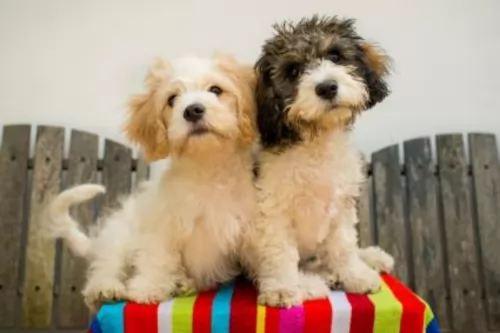 The Cavachon is a small dog, so if you have a nice sized garden, a lot of his exercise needs will be met. However he will still want a walk every other day and appreciate ball games in the garden. He can adapt to living in much smaller places but then he will certainly need to be exercised.
The Cavachon is a small dog, so if you have a nice sized garden, a lot of his exercise needs will be met. However he will still want a walk every other day and appreciate ball games in the garden. He can adapt to living in much smaller places but then he will certainly need to be exercised.
Small dog breeds like the Cavachon have a quick metabolism and you want to feed him a top quality dog food high in protein and fat. Protein is important as it supports growth in puppies and promotes lean muscle mass in adult dogs.
The Cavachon’s hair sheds very little, so grooming and brushing will only be required twice a week. His hair may need to be clipped every now and then to keep him well groomed. If you don’t have the experience or the required tools, a professional dog salon in your area will be able to do it for you.
The nails must also be clipped regularly and the ears kept clean and dry to prevent ear infections. His teeth will need to be cleaned at least 2 or 3 times a week with special dog toothpaste and toothbrush to prevent dental decay.